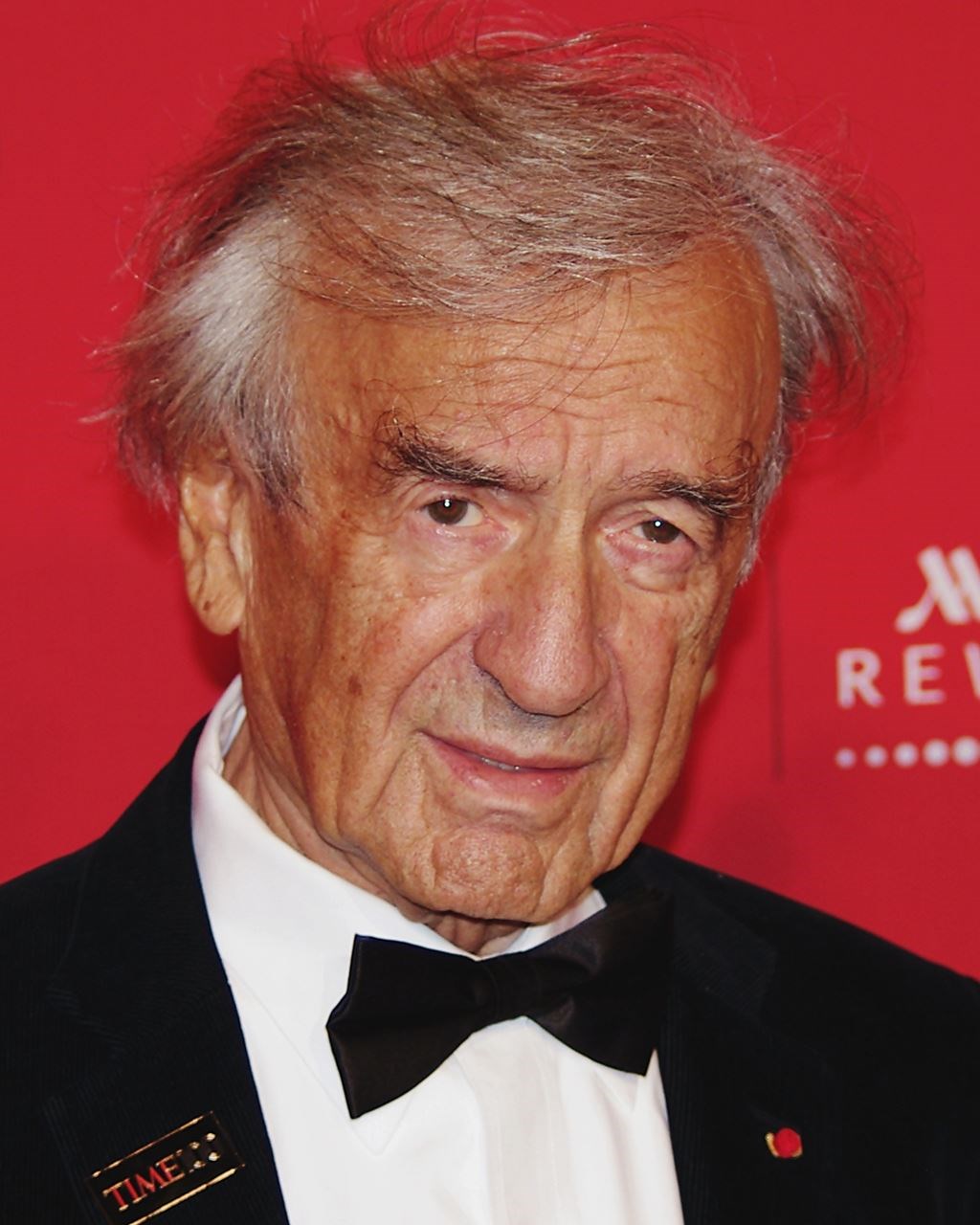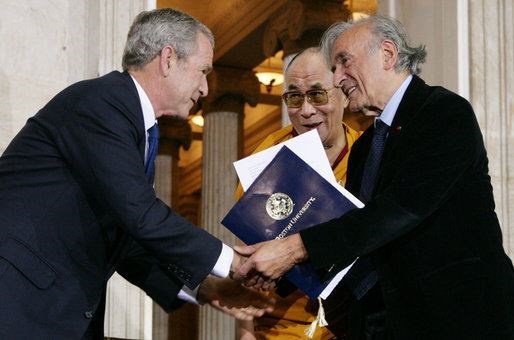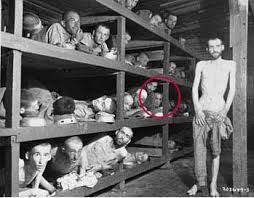 Elie WieselWikimedia Commons A Light Amid the Darkness
Elie WieselWikimedia Commons A Light Amid the Darkness
With the new Avengers movie Avengers: Infinity War about to release, everyone has been talking about the wise and all-mighty superheroes who constantly save the universe. Our society worships these caped superheroes, and they dominate the spotlight of our world’s glorified people. But maybe there is more to heroism. A wise man once said, “Is a hero a hero twenty-four hours a day, no matter what? Is he a hero when he orders his breakfast from a waiter? Is he a hero when he eats it? What about a person who is not a hero, but who has a heroic moment?”(Wiesel). To answer these questions we have to look beyond our caped heroes, and hopefully raise the capeless heroes up high to be as true role models and inspirations. We all have our heroic figures whom we look up to and each embody different characteristics. Some aspire to be Nelson Mandela others Rosa Parks. People say a hero is someone who lifts up others, has courage and empathy, or risks their lives for others. These traits all contribute to a single definition of heroism. A hero contains a quality, an x-factor that stands out beyond our cultures “norms.” A hero must also be inspirational. They should inspire others to strive to be as magnificent as they are. Someone heroic should be the best version of himself and reach for greater heights to make an impact on others. In essence, a hero is not a title we all can put on our resumes because it is something only achieved through living an altruistic life and working hard to create a positive change in the world of others.
Elie Wiesel, a wise man, exemplifies these heroic traits by overcoming numerous tribulations and still managing to create an impact around the globe. Wiesel was born in a small town named Sighet, Romania and entered the world on September 30, 1928. His early life was composed of God, family, and community. This pleasant life took a turn into a morbid darkness in 1944. For the next twelve months, 15 year-old Elie was placed in three concentration camps, watched his mother walk away for the very last time, lived off of two stale bread portions and watery soup in the chilling, icy cold while working long, strenuous hours without the right equipment, and witnessed himself lose hope as a broken man. He discovered his true character as death came knocking at his door and when the people he loved most departed into God's fingertips. Following his time locked away from the world, Wiesel spent his life motivated to prevent the events and emotions he had experienced from ever occurring to anyone else. He went through great lengths to help others to accomplish all that he did, despite the hardships he encountered. Eventually, his work became widely appreciated and Wiesel became a very decorated activist. Not to mention the impact he had on the young generation and those to come by being an activist for world peace. Sadly, Elie Wiesel passed away on July 2, 2016 at the age of 87. His death was deeply mourned; however, the effects he had on the world still leave an impact on people today. Elie Wiesel confronted fear, defeat, and sorrow a countless number of times, yet his tenacity never let him succumb to these phantoms of darkness despite how alluring they may have seemed. Wiesel also used his selflessness to help save his father and save people of all backgrounds. He thrived in his life following his time in concentration camps and became an inspiration to the world. Amid the darkness of the Holocaust, Elie Wiesel remained a light that never ceased to burn and even in the great depths of human deprivation, he illuminated his flame of kindness and hope to those who needed it most, exhibiting the characteristics of a true hero.
 Wiesel accepts Nobel Peace PrizeWkimedia Commons To change the world Elie Wiesel used tenacity to overcome the relenting obstacles he faced on his journey of survival, activism and change. In “Night,” his memoir uncovering the darkness he lived in and experienced at the age of fifteen, Wiesel depicts not only how close to death he came, but also his tenacious desire to survive:
Wiesel accepts Nobel Peace PrizeWkimedia Commons To change the world Elie Wiesel used tenacity to overcome the relenting obstacles he faced on his journey of survival, activism and change. In “Night,” his memoir uncovering the darkness he lived in and experienced at the age of fifteen, Wiesel depicts not only how close to death he came, but also his tenacious desire to survive:
My foot was aching, I shivered with every step. Just a few more meters and it will be over. I’ll fall. A small red flame… A shot… Death enveloped me, it suffocated me. It stuck to me like glue… Chilled to the bone, our throats parched, famished, out of breath, we pressed on… We were stronger than cold and hunger, stronger than guns and the desire to live, doomed and rootless, nothing but numbers, we were the only men on earth.(Wiesel 86)
Wiesel captivates the reader in his pain and suffering in order to emphasize the cruelty he experienced at such a young age. The Nazis treated the young boy as if he was nothing and worked him to the brink of death. Elie Wiesel withstood this metaphorical death and persevered, continuing on with his life no matter how difficult it may have been. He did not give up and he put all his effort to winning his battles. This urge to push on shows his grit and tenacity. He is able to withstand harsh situations with his vast capacity of determination, will to survive, and unyielding persistence. These characteristics are the definition of tenacity, a quality essential in a praiseworthy person. Wiesel made the decision to live a life of greatness and create a change in the world, a decision which defines a truly heroic figure. It is this change and life he leads that is noticed the most, as one of his close friends demonstrates: “His examined life is an example to all who have experienced pain, victimization, injustice, and survival. Without forgiving the unforgivable, excusing the inexcusable, or forgetting the unforgettable, he has looked to the future. He has placed himself in harm's way repeatedly in the quest for peace, whether in war-torn Yugoslavia, the rocket-ravaged Israel during the Gulf War, or other places from which even God has seemingly stayed away”(Dershowitz 5). The quote mentions, “... or other places from which even God has seemingly stayed away from,” which is significant because it showcases his willingness go right to the frontlines to fight for what he believes in. Wiesel has repeatedly gone through struggles and dangers simply because of his passion and determination to help others. He risks his life time and time again by putting himself in situations that jeopardizes his life for the greater good of others and the world. Wiesel stands up to people in power when others do not. He helps those who have had experienced suffering and becomes their light to help them escape out of their unescapable shadows. He puts himself in situations others would not which displays his qualities of tenacity greatly surpass others. This ability to be determined, allows Wiesel to accomplish great things most others would not be able to accomplish. What is more, is that Elie Wiesel uses his tenacity to unselfishly help other rather than himself. As seen through his capacity to tenaciously carry on and spread hope to others, Elie Wiesel can be depicted as someone to look up to and call your hero.
 Wiesel in the campmarucha.wordpress.com Wiesel can be characterized as an admirable hero due to his constant selfless mindset for others. Elie Wiesel showed his selflessness through his actions and not just his words and is captured well by Deborah Lee in her article, as she says: “Because of his suffering under the Nazis, which includes the murder of his parents and his sister, Wiesel maintains an abiding commitment to alleviate social injustice and to raise awareness of the disenfranchised” (Lee 1). Elie Wiesel’s childhood agony became a burden he carried into his adulthood. Nevertheless, he sacrificed himself and opens up to others on his past experience to help make a change. Elie Wiesel spoke out about those in need and helpless so that others could be inspired. Wiesel could easily live an ordinary life full of fear: fear of his emotions, fear of the past, and fear of others. Wiesel conquered these fears to achieve his goals. He watched his family disappear into death’s hands, and this left a scar even the strongest remedy could not heal. Wiesel chose a path toward showing his wound to others in the hope of no one else having the same grief he did. By sacrificing his life to making a difference, controlling his fears of the past, and being a beacon of light for those in the dark, Elie Wiesel suffered internally for others because of his desire to make a positive change. Elie Wiesel detailed in his book, once again, his closeness to death and longing to get rid of his misery and torment: “My Father’s presence was the only thing that stopped me. He was running next to me, out of breath, out of strength, desperate. I had no right to let myself die. What would he do without me? I was his sole support”(Wiesel 86). In this specific instant, death is the solution to all of Wiesel’s problems. He found himself yearning for death. However, he had the ability to step back, think about not just himself, and realize the consequences of his death. Staying alive is imperative to him because Wiesel knows that he was the only thing separating his dad from death. Wiesel demonstrated his raw selflessness for his father at a time of morbid suffering. Wiesel’s selflessness empowers others to follow his commendable personality. This unwavering selflessness and sacrifice Elie Wiesel went through is what separates him from the average person to a person worthy of being called a hero.
Wiesel in the campmarucha.wordpress.com Wiesel can be characterized as an admirable hero due to his constant selfless mindset for others. Elie Wiesel showed his selflessness through his actions and not just his words and is captured well by Deborah Lee in her article, as she says: “Because of his suffering under the Nazis, which includes the murder of his parents and his sister, Wiesel maintains an abiding commitment to alleviate social injustice and to raise awareness of the disenfranchised” (Lee 1). Elie Wiesel’s childhood agony became a burden he carried into his adulthood. Nevertheless, he sacrificed himself and opens up to others on his past experience to help make a change. Elie Wiesel spoke out about those in need and helpless so that others could be inspired. Wiesel could easily live an ordinary life full of fear: fear of his emotions, fear of the past, and fear of others. Wiesel conquered these fears to achieve his goals. He watched his family disappear into death’s hands, and this left a scar even the strongest remedy could not heal. Wiesel chose a path toward showing his wound to others in the hope of no one else having the same grief he did. By sacrificing his life to making a difference, controlling his fears of the past, and being a beacon of light for those in the dark, Elie Wiesel suffered internally for others because of his desire to make a positive change. Elie Wiesel detailed in his book, once again, his closeness to death and longing to get rid of his misery and torment: “My Father’s presence was the only thing that stopped me. He was running next to me, out of breath, out of strength, desperate. I had no right to let myself die. What would he do without me? I was his sole support”(Wiesel 86). In this specific instant, death is the solution to all of Wiesel’s problems. He found himself yearning for death. However, he had the ability to step back, think about not just himself, and realize the consequences of his death. Staying alive is imperative to him because Wiesel knows that he was the only thing separating his dad from death. Wiesel demonstrated his raw selflessness for his father at a time of morbid suffering. Wiesel’s selflessness empowers others to follow his commendable personality. This unwavering selflessness and sacrifice Elie Wiesel went through is what separates him from the average person to a person worthy of being called a hero.
By spreading hope and showing benevolence throughout his life to all, even after a crippling traumatic experience, Elie Wiesel demonstrated all traits needed to be considered a hero by the logical person. Elie Wiesel revealed his undisguised tenacity and will to fight on in many of his experiences as a Holocaust survivor. He endured the worst the world has to offer; moreover, Wiesel continued his fight for world peace and safety through his activism of relentlessly battling injustices to prevent what happened to him from happening to anyone else. Furthermore, Elie Wiesel selflessly opened up on the memory that caused so much pain. Wiesel could have easily said he never wishes to talk about such a horrific time in his life; instead, he allowed others to see into his past and show them his scars. Wiesel’s selfless personality can also be viewed in his close relationship with his dad; Wiesel sacrificed himself numerous times for his father and struggled greatly to keep his dad alive. He could have been like the other sons and abandon him and taken advantage of his food, instead he did the exact opposite. Wiesel is a hero because of his tenacity to overcome his obstacles and selflessness to help the good of others. Elie Wiesel contained the best qualities we look for in ourselves. He was courageous, empathetic, kind, intelligent, and he was also human. He constantly reminded his readers of his poignant humility: “One day when I was able to get up, I decided to look at myself in the mirror on the opposite wall. I had not seen myself since the ghetto. From the depths of the mirror, a corpse was contemplating me. The look in his eyes as he gazed at me has never left me” (Wiesel 115). Wiesel had gone through so much yet here he stands skin and bones, fragile as can be. He had the will to survive something we only imagine in the worst of our nightmares. Not many can say at the age of sixteen they were a holocaust survivor. Not many can live a life as empowering as he did and not many can have the courage he dared to carry even in the times he wanted to give up the most. Nevertheless, we can have the inspiration to fight our own battles derived from Elie’s courage and strong mindset. An inspirational person needs to be able to motivate others and Wiesel did exactly this. A friend of his reflects: “Whether answering questions after his powerful and passionate lectures, which combined his memory of the Holocaust with moral fervor about humanity’s responsibilities, or more informal dialogue when meeting with students, he always made the people he met, and especially students feel that they were important. He had infinite patience and a gracious, welcoming manner which made those in his presence feel comfortable”(Schwarz). Wiesel treated everyone he met with respect and as if they were the next Mandela. He knew that we all have lots of potential and by empowering others he inspired them to be the admirable person he is. I look up to him. I look up to him as the person who did something great, and not just one great thing, but a lifetime of great things. Elie has influenced me to be brave when others are not, wise when others can not see the whole picture, and selfless when others are in need of support. When leading others I aspire to help others, be compassionate to them, and love them just as he did. He inspires me to become a person others look up to, a person that can change the world, and a person who is a hero. Elie Wiesel may not have worn a cape, nonetheless, he was much more than the people in costumes fighting off the bad guys. He left an impact on this generation and the generations to come by guiding others out of a desolate cave filled with darkness to a hopeful world teeming with light.
Sources Cited
Dershowitz, Alan. “A Biblical Life.” PBS, Public Broadcasting Service, 2002, www.pbs.org/eliewiesel/life/dershowitz.html.
Prescott, Deborah Lee. "Elie Wiesel." Great Lives from History: Jewish Americans, July 2010, p. 26. EBSCOhost, search.ebscohost.com/login.aspx?direct=true&db=b6h&AN=55596529&site=brc-live.
Wiesel, Elie, and Marion Wiesel. Night. Hill and Wang, a Division of Farrar, Straus and Giroux, 2017.
Elie Wiesel." Encyclopedia of World Biography, Gale, 1998. Biography In Context, https://link.galegroup.com/apps/doc/K1631006970/BIC?u=powa9245&sid=BIC&xid=1f2d1734. Accessed 16 Apr. 2018.
Page created on 5/29/2018 1:44:44 AM
Last edited 5/29/2018 9:30:03 PM
